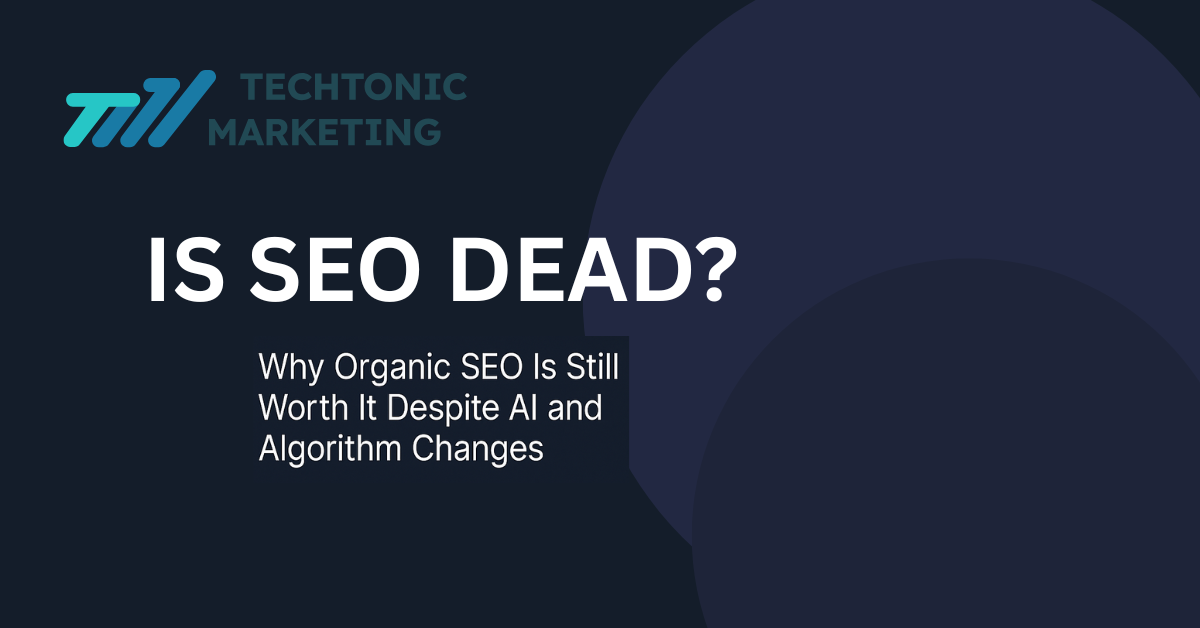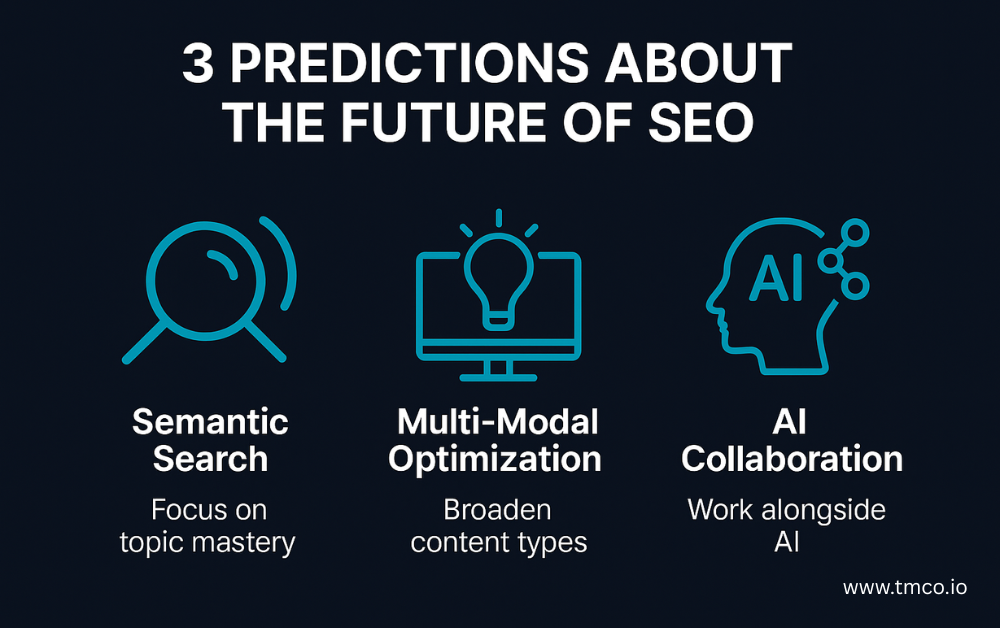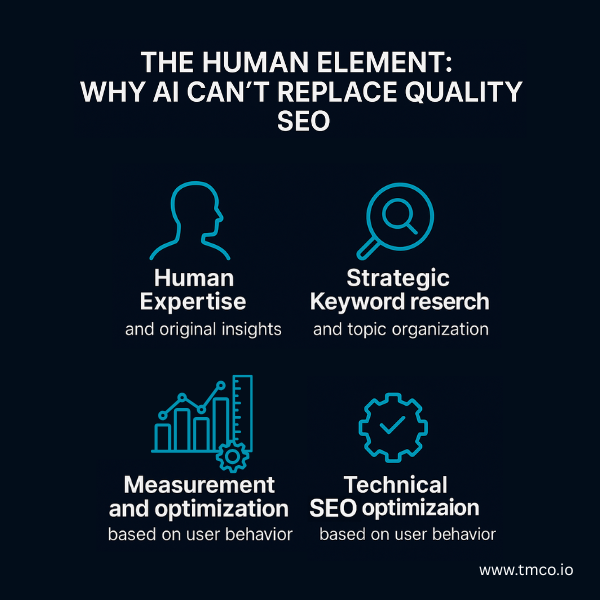
In an era dominated by AI-generated content and Google’s evolving algorithms, digital marketers everywhere are asking: Is SEO dead?
The short answer is a resounding no. Despite countless premature obituaries, SEO remains very much alive in 2025, though it has transformed significantly. According to recent stats, 35% of consumers still use search engines as their primary method for researching purchases, outpacing both social media and retailer websites combined.
This search behavior confirms what experienced marketers already know: quality organic SEO continues to deliver considerable value when implemented correctly.
Why People Keep Declaring SEO Dead (And Why They’re Wrong)
Every time Google updates its algorithm or introduces new search features, a wave of “SEO is dead” claims sweeps through marketing communities. This reaction isn’t new, it’s happened consistently since the early 2000s.
But what’s really driving these claims, and do they matter?
The Rise of Google’s Search Generative Experience (SGE)
The launch of Google’s Search Generative Experience (SGE), now driven by Gemini AI, caused concern among many marketers. SGE provides comprehensive answers directly at the top of search results, seemingly eliminating the need for users to click through to websites.
For example, a search for “best laptop for video editing” now delivers a complete AI-generated response comparing options, price points, and technical requirements, all before displaying traditional search results. This has undeniably decreased organic click-through rates for informational queries.
Unpopular opinion: SGE creates new opportunities for visibility. Content that Google’s AI references as authoritative sources appears with attribution links, often driving traffic to sites with demonstrable expertise. Rather than killing SEO, SGE has simply raised the bar for quality and encouraged more specialized, expert-driven content.
Paid Search Domination
Another common argument is that paid results have pushed organic listings too far down the page to matter. On mobile devices, especially, users may need to scroll significantly before reaching the first organic result.
However, this overlooks two crucial facts:
- Paid search is increasingly expensive and competitive, making sustainable ROI challenging
- Users have developed “ad blindness”, and many deliberately scroll past paid results to find organic listings they perceive as more trustworthy
The solution isn’t abandoning SEO but rather adapting strategies to capture attention even when positioned lower on the page through compelling titles, rich snippets, and relevant content that delivers exactly what searchers need.
Content Saturation
With an estimated 7 million blog posts published daily in 2025, standing out seems impossible. Many marketers conclude that the content space is simply too crowded for new entrants to gain traction through SEO.
This perspective misunderstands the modern search ecosystem: while quantity has exploded, quality remains surprisingly rare.
Google’s E-E-A-T (Experience, Expertise, Authoritativeness, Trustworthiness) guidelines increasingly favor content created by genuine subject matter experts.
Technical expertise properly communicated through content can still capture valuable search visibility even in competitive niches.
3 Predictions About the Future of SEO
The future of SEO isn’t extinction but evolution. As search technology advances, effective SEO strategies adapt consistently.
Understanding the upcoming shifts in search behavior and algorithm priorities is essential for businesses looking to maintain or improve their organic visibility.
Here are 3 predictions about the future of SEO through 2025 and beyond.

Future of SEO Prediction 1: Organic SEO Is Worth It Through Semantic Search Mastery
Despite claims to the contrary, organic SEO is worth it now more than ever, but success requires understanding semantic search. Google has moved far beyond simple keyword matching to understanding topics, entities, and user intent.
In 2025, successful SEO demands content that demonstrates comprehensive topic mastery rather than keyword density. This means:
- Developing interconnected content clusters that cover topics rigorously
- Incorporating relevant entities (people, places, concepts) that demonstrate subject knowledge
- Answering related questions users might have, even if not explicitly searched for
This approach satisfies both traditional search algorithms and provides the contextual knowledge that powers AI-generated responses in SGE. Sites that implement this strategy consistently outperform competitors focused solely on keyword optimization.
Future of SEO Prediction 2: The Rise of Multi-Modal Search Optimization
The scope of SEO in the future extends far beyond text-based content. As voice search, image recognition, and video search mature, successful SEO increasingly requires optimizing for multiple search modalities.
In practical terms, this means:
- Structured data implementation becomes non-negotiable for all types of content
- Images require comprehensive alt text and contextual relevance
- Video content needs proper transcription, timestamps, and structured formatting
- Voice-friendly content must directly answer common questions in conversational language
Our research shows that websites implementing multi-modal optimization see up to 37% more organic visibility across different search entry points compared to text-only optimization strategies.
Future of SEO Prediction 3: Future of SEO With AI – Technical SEO Becomes More Critical, Not Less
The future of SEO with AI paradoxically increases the importance of technical SEO fundamentals. As content creation becomes more automated, technical implementation becomes a key differentiator.
Core Web Vitals, site architecture, searchability, and proper handling of JavaScript continue separating successful sites from non-successful ones. Additionally, new technical considerations have emerged:
- AI-content detection signals must be properly managed
- Entity markup needs careful implementation
- Mobile-first design must adapt to new interaction patterns
Technical SEO specialists remain among the most valuable members of digital marketing teams, with demand growing rather than decreasing in 2025.
How To Succeed With Advanced On-Page SEO in 2025
The future of advanced on-page SEO depends on understanding how Google evaluates content quality. Modern optimization techniques have evolved far beyond traditional elements like keyword density and heading structure. Businesses that master these advanced approaches consistently outperform competitors relying on outdated tactics.

The E-E-A-T Renaissance
Google’s expanded E-E-A-T evaluation (Experience, Expertise, Authoritativeness, Trustworthiness) now heavily influences ranking positions. Successful pages demonstrate:
- Clear author expertise verification (detailed author bios, credentials, publication history)
- First-hand experience with the subject matter (original research, case studies, unique insights)
- External recognition of authority (citations, references, mentions)
- Trust signals (comprehensive information, balanced perspectives, factual accuracy)
Implementing these elements isn’t just about pleasing algorithms, it creates superior content that serves user needs more effectively.
Content Depth vs. Content Volume
In the future of SEO in generative search, depth consistently outperforms volume. Our analysis shows that pages ranking in the top three positions average 50% more comprehensive coverage of topics compared to positions 4-10.
Practically speaking, this means:
- Detailed topic coverage over superficial keyword usage
- Original research and data presentation
- Expert perspectives and unique insights
- Multimedia content integration that enhances understanding
The most successful sites publish less frequently but with greater depth and substance, focusing resources on creating definitive resources rather than high-volume content calendars.
Strategic Internal Linking
Internal linking has evolved from a simple SEO tactic to a sophisticated content strategy.
Effective internal linking now:
- Creates topical clusters that demonstrate subject matter expertise
- Guides users through logical information discovery paths
- Distributes page authority to priority content
- Surfaces-related content at precisely the right moment in the user journey
This approach not only improves rankings but significantly enhances user engagement metrics that feed back into SEO performance.
Is SEO Dead in 2025?
The question “Is SEO dead in 2025?” reflects understandable anxiety about rapid changes in search technology. However, examination of actual search behavior reveals SEO remains vital, though dramatically different from previous years. The truth is that SEO continues to evolve rather than die, requiring marketers to adapt their strategies accordingly.
Studies show that:
- 68% of online experiences still begin with a search engine
- Organic search drives 53% of website traffic on average
- Conversion rates from organic search remain 2-3x higher than social media traffic
The key distinction is that low-quality SEO approaches have indeed died. Keyword stuffing, thin content, and manipulative tactics no longer work. What survives and thrives is SEO built on genuine value creation, expertise, and technical excellence.
Most importantly, highly specialized expertise properly communicated through content continues to generate substantial organic search visibility even in competitive markets.
The Human Element: Why AI Can’t Replace Quality SEO
Despite advancements in AI content generation, a crucial element remains missing from machine-created content: authentic human experience. Google’s algorithms have become increasingly sophisticated at detecting content that lacks genuine insights, practical knowledge, and the nuanced understanding that comes from real-world expertise.
This creates a significant competitive advantage for businesses that invest in content created by genuine subject matter experts rather than AI content generators.

The most successful SEO strategies in 2025 combine:
- Human expertise and original insights
- Strategic keyword research and topic organization
- Technical excellence in implementation
- Measurement and optimization based on user behavior
When these elements come together, organic search visibility becomes not just possible but predictable, even in highly competitive markets. The businesses that understand this are consistently outperforming competitors who chase shortcuts or declare SEO dead prematurely.
Why Partner With Techtonic Marketing for SEO Services in 2025
At Techtonic Marketing, we’ve built our approach on the understanding that SEO isn’t dead — it’s simply evolved beyond recognition. While many agencies cling to outdated tactics, our team has developed methodologies specifically designed for the search landscape of 2025 and beyond.
Our unique approach combines:
- Technical Expertise – We implement flawless technical SEO foundations that give your content the best possible chance to rank.
- Expert-Driven Content – Unlike agencies using AI content generators, we pair subject matter experts with SEO strategists to create content that demonstrates genuine expertise.
- Comprehensive Data Analysis – Our proprietary analytics framework tracks not just rankings but the engagement metrics that actually influence modern search performance.
- Multi-Modal Optimization – We ensure your content performs across all search entry points: traditional text search, voice, image, and video.
This methodology has delivered consistent results even as search algorithms have evolved dramatically. Our clients typically see a 40-60% increase in qualified organic traffic within six months, with continued growth as our strategies compound over time.
Is SEO Dead? No, But It Is Evolving
Is SEO dead? Far from it. The data conclusively shows that organic SEO is worth it when implemented with expertise and strategic vision.
The future of SEO with AI, advanced on-page optimization techniques, and adaptation to generative search all point to a discipline that’s evolving rather than disappearing. The scope of SEO in the future remains strong for those willing to adapt.
What has died are outdated practices and low-effort content strategies. In their place, a more sophisticated, expertise-driven approach has appeared. Organizations that invest in quality organic SEO best practices continue seeing significant returns, with the added benefit that these approaches tend to be more sustainable.
The future of advanced on-page SEO and the future of SEO in generative search both depend on embracing this evolution rather than clinging to past tactics. For marketers willing to adapt, the opportunities in 2025 remain substantial.
Ready to transform your SEO strategy for 2025? Schedule a free strategy session with our team to discover how our approach can drive sustainable organic growth for your business.
Frequently Asked Questions (FAQs)
Is technical SEO still important in 2025?
Technical SEO has become more critical than ever in 2025. As content creation becomes more accessible through AI tools, technical execution quality is a significant competitive distinguishing factor that significantly impacts rankings and user experience.
How has AI changed SEO practices?
AI has transformed SEO by enabling more sophisticated search algorithms, generating direct answers in search results, and creating competitive content at scale. Successful SEO now requires demonstrating genuine expertise, technical excellence, and user value that AI-generated content can’t easily replicate.
What SEO metrics matter most in 2025?
Beyond traditional rankings and traffic, engagement metrics like dwell time, interaction depth, and content consumption patterns have become critical SEO indicators in 2025. These signals help Google determine content quality and relevance in ways keyword rankings alone cannot.
Is organic traffic still valuable compared to paid search?
Organic traffic remains highly valuable in 2025, delivering 2-3x higher conversion rates than paid search on average. While paid search provides immediate visibility, organic SEO creates sustainable traffic that doesn’t disappear when you stop paying.
How often should I update content for SEO in 2025?
In 2025, strategic content updates are more important than frequency. High-performing pages should be refreshed at least quarterly, while comprehensive updates addressing E-E-A-T signals, new information, and competitive gaps should be performed annually.